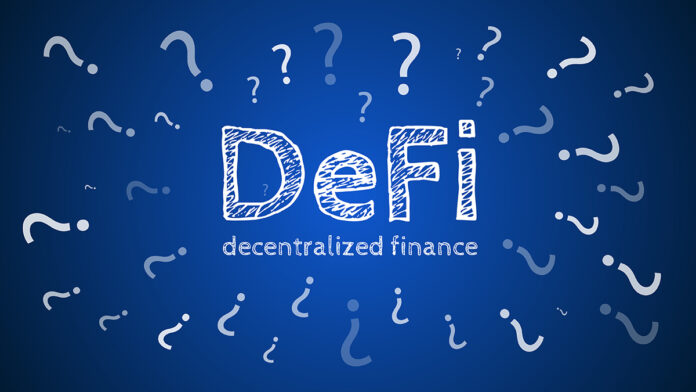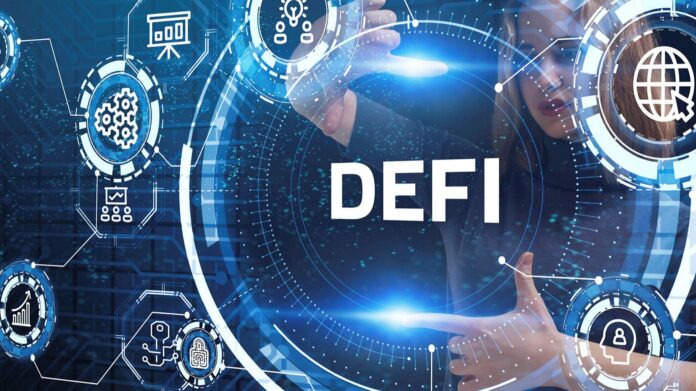Are you worried about how to navigate the changing financial landscape? The DeFi revolution is here to help. By decentralizing the traditional banking system and introducing exciting new alternatives for investing, saving, and borrowing, DeFi is making the world of finance more accessible than ever. Discover how this revolutionary technology can empower you!
Introduction to DeFi: What is DeFi and How Does it Work?
DeFi (Decentralized Finance) is an increasingly popular term in the crypto community. It is a revolutionary new way of borrowing, lending, trading, and investing using cryptocurrency and blockchain technology. DeFi allows users to access the financial system without relying on traditional institutions such as banks or governments. The transactions are typically done over a decentralized network of computers or nodes run by users, meaning no single entity can control them.
The Benefits of DeFi: Increased Accessibility, Lower Fees, and More

The primary benefits of DeFi are twofold: affordability and self-reliance. By connecting investors directly with financial products and developing companies like OOXY Labs, these platforms significantly reduce fees for users, who can now manage their own accounts with little to no transaction costs. Additionally, DeFi protocols allow users more freedom regarding the ownership structure of their funds, enabling them to better protect their assets should something go wrong with a particular platform’s services.
Finally, DeFi is bringing increased efficiency through automated processes such as smart contracts. These agreements are computer programs that enforce rules without requiring the usual paperwork that slows down transactions in traditional financial systems. Smart contracts can facilitate transactions within seconds while they remain secure through cryptography-based authentication methods and blockchain technology that guarantees data immutability, protecting users’ funds from hackers or malicious actors who may attempt theft or fraud activities on traditional networks and platforms.
Investing with DeFi: Automating Your Portfolio and Accessing New Assets
One revolutionary development in recent years is DeFi (Decentralized Finance). This technology has given users the ability to automate their portfolios, access new assets, and benefit from increased privacy. With DeFi projects being largely open-source and hosted on blockchain networks, it provides users with a high degree of autonomy and control over their investing decisions.
DeFi allows users to manage their portfolio more efficiently by relying on specific parameters pre-set into smart contracts which provide a level of risk management not found in traditional asset classes. This automation can take many forms including automated margin trading, algorithmic trading bots, and smart yield farming strategies which adjust exposure and rebalancing processes as market conditions fluctuate throughout the day.
In addition, users now have access to previously unavailable investment opportunities such as participation in venture capital rounds through digital security tokens or even lending out locked digital assets for interest income without ever needing to transfer them into a bank account or brokerage service.
Saving with DeFi: Yield Farming and Earning Passive Income

Yield farming is the practice of leveraging DeFi protocols to earn returns by providing liquidity to various projects, primarily through staking and lending. By doing so, users can earn a passive income in the form of rewards or interest payments. This differs from traditional investment strategies that are often reliant on market speculation and require active management.
Furthermore, decentralized financial applications allow for access to higher-yield investments without having to trust a third-party custodian. Potential benefits of yield farming include higher yields than what can be found in banks and greater liquidity potential as users can quickly redeem their funds from any DeFi protocol.
DeFi protocols use an automated process called “smart contracts” that allows a user to deposit funds or digital assets into a protocol in order to receive rewards or interest payments; this mechanism helps generate higher returns for depositors who are looking for steps toward earning passive income without having to risk their capital on traditional investments vehicles. Yield farming also allows users to diversify their investment portfolio across multiple cryptocurrency markets, protecting them from volatility.
Borrowing with DeFi: Secured Lending and Flexible Loan Terms
Borrowing with DeFi allows individuals to access liquidity directly from the marketplace. This eliminates long loan processing times, high-interest rates, and restrictive terms typical of traditional lenders. DeFi secured lending protocols provide peer-to-peer lending with minimal counterparty risk. Borrowers receive loan offers based on risk assessment, creditworthiness, and collateral requirements.
DeFi protocols typically have flexible loan terms and provide options for repayment or renewal. For example, automated market makers offer loans with adjustable interest rates that never exceed their deposit rate — this gives borrowers assurance of the terms of their loan before entering into a contract. DeFi borrowing also offers ease of transaction without ever needing to leave the blockchain environment — users can quickly and securely access funds without having to transfer controlled assets ‒ all within a single platform.
The Potential of DeFi: Unlocking New Financial Opportunities

Decentralized Finance provides new opportunities for both users and businesses seeking a better way to manage their finances. By removing costly intermediary fees from transactions, it unlocks new financial services and products such as lending criteria automation, yields farming (earning rewards on cryptocurrencies), asset tokenization (issuing cryptocurrency backed by real assets), stablecoin issuance (creating digital currencies pegged to a fiat reference rate) & more.
In addition to providing these digital services without requiring mediation or excessive fees, DeFi offers an element of privacy that traditional banking systems often lack. This is achieved by using smart contracts on decentralized networks so data is not stored in one centralized location which increases its privacy & security. Furthermore, open-source protocols allow developers to experiment with new applications related to trading & liquidity provision without facing restrictive regulations or permission rules from governing bodies like Certificates of Departments of Business Oversight (or CABO). As a result of these advantages, DeFi often provides higher returns with lower risks compared to traditional investments.
Conclusion: The Future of DeFi and Its Impact on Financial Services
Looking into the future, DeFi is sure to have a lasting impact on how we interact with finances. As it continues to grow in popularity globally, its benefits will be enjoyed by a wider audience – including everyday consumers as well as larger organizations. As this revolution continues to unfold and mature in the months ahead, it is sure to transmit larger changes across many aspects of our lives.




